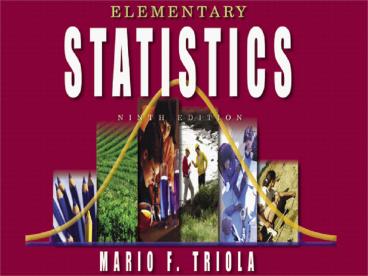45 The Poisson Distribution PowerPoint PPT Presentation
1 / 23
Title: 45 The Poisson Distribution
1
(No Transcript)
2
Chapter 5Normal Probability Distributions
- 5-1 Overview
- 5-2 The Standard Normal Distribution
- 5-3 Applications of Normal Distributions
- 5-4 Sampling Distributions and Estimators
- 5-5 The Central Limit Theorem
3
Chapter 5 Continuous Probability Distributions
and the Standard Normal Distribution
Created by Erin Hodgess, Houston, Texas
4
LAPTOP3
Continuous Random Variables
- Continuous random variables take on an infinite
number of values - Continous Probability Distributions are shown by
- Probability function, f(x), or
- Probability Curves
5
Probability Density Curves
- Probability Density Curve is the graph of a
continuous probability distribution. - Characteristics
- The total area under the curve must equal 1.
- Every point on the curve must have a vertical
height that is 0 or greater.
Because the total area under the density curve is
equal to 1,there is a correspondence between area
and probability!
6
Common Probability Curves
- Uniform
- Gamma
- Normal
7
LAPTOP3
Normal Probability Distributions
- A continuous random variable x has a normal
distribution if graph is bell-shaped and
symmetric about its mean, µ. - Using s, it also satisfies the 68-95-99.7 rule.
Notation xN(µ,s)
8
Heights of Adult Men and Women
Figure 5-4
9
Section 5-2 The Standard Normal Distribution
10
Standard Normal Distribution
- Standard Normal Distribution a normal
probability distribution that has a mean of 0 and
a standard deviation of 1. - x N(0,1) implies these are z-scores!
- z N(0,1)
Figure 5-5
11
Area and the Standard Normal Curve
- Two types of questions
- Given z-scores, find area (probability)
- Given area (probability), find z-score
12
(No Transcript)
13
Section 5-3 Applications of Normal Distributions
Created by Erin Hodgess, Houston, Texas
14
Nonstandard Normal Distributions
- Given xN(µ,s), there are 2 applied questions
- Find the probability associated with given data
values, x - Find the data value associated with a given
probability
15
Normal Distributions Finding Probabilities
- Given data values, x, find probability
- Sketch xN(µ,s). Shade area of interest. Write
a probability statement in terms of x. - Find z-scores for x boundaries
- Write a probability statement in terms of z.
- Use Table 2 to find the area under the standard
normal curve.
x? z ? P
16
Given data values, x, find probability
x? z ? P
17
Normal Distributions Finding Data Values
- Given probabilities, find data values, x
- Sketch xN(µ,s). Shade the given area.
- Use Table 2 to find the z-score associated with
the above area. - Convert the z-score to a data value.
P? z ? x
18
Sections 5.4-5.5 Sampling Distributions and the
Central Limit Theorem
Created by Erin Hodgess, Houston, Texas
19
Sampling Distributions
- Suppose you take repeated samples of the same
size from a population. - For each sample, you calculate the same
statistic. The sample statistics change from
sample to sample (this is called sampling
variability) - If you plotted all those statistics, what would
be their shape, center, and spread?
20
Sampling Distributions of Sample Means
- Given a population with mean µ and a standard
deviation s - If repeated samples of the same size n are drawn
from the population, and x is computed from each
sample, then the xs have the following
probability distribution
21
Sampling Distributions of Sample Means
- Mean of the sample means
- Standard deviation of the sample means
- (often called the standard error of the mean)
(Note averages vary less than individuals) - Shape of the sample means (Central Limit
Theorem) - If the population is normal, the xs will be
normal (for any n) - If the population is not normal, but n 30 ,
then the xs will be normal anyway.
22
Finding Probabilities for Sample Means
- For population, x xN(µ,s)
- The z-score for x is
- For sample means, x xN(µx,sx)
- The z-score for x is
23
Definition
The Sampling Distribution of the Proportion is
the probability distribution of sample
proportions, with all samples having the same
sample size n.

